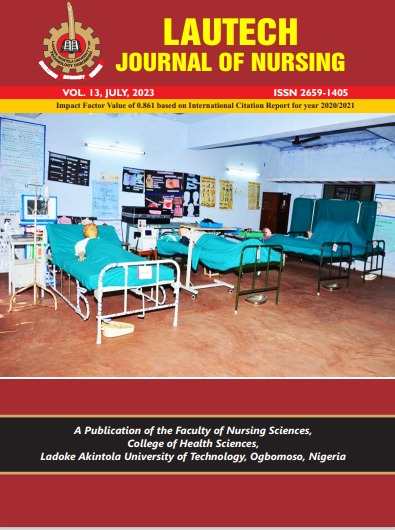The provision of quality care requires a team approach that utilizesward roundsto make the right decisions on the patient’s state of health. The barrier to nurses and midwives’ effective participation in a ward round is detrimentalto holistic nursing care. Itis on this basis that this study was carried out to investigate barriers to nurse participation in the Multidisciplinary ward rounds in Abubakar Tafawa Balewa University Teaching Hospital (ATBUTH) Bauchi.Across-sectional descriptive research
design was employed. The target population was Nurses and MidwivesinATBUTH Bauchi.The sample size of 146 was determined usingYamane’sFormula. Aproportionate stratified sampling technique was used to select six (6) nurses and midwives from each ward. A self-structured questionnaire of 4 points Likert scale response anchors consisting of five (5) Sections was utilized to collect data. Approval from the research and ethical committee of ATBUTH was granted. Data were analyzed using Microsoft Excel.Out of 146 questionnaires distributed 112 (77%) were retrieved. The majority 80(70%) of the respondents were female, 47 (42%) were within the age group 31- 40 years, 92 (82%) were married, and 44 (39%) were Nursing Officers I & II. The majority 69(62%) had diplomas, and the majority 33 (30%) had working experiencewithin 6-10 years. Using the criterion mean of 2.5 for criterion decision, where below is rejected and above accepted. The findings revealed that barriers affecting nurses’ and midwives’ participation in multidisciplinary ward round were: organizational barriers (3.1), workload barriers (3.0), and professional team barriers (3.0). In this regard, nurses’ and midwives’ participation in multidisciplinary ward rounds in ATBUTH is paramount for quality care. Identified challenges needs urgent intervention.
- SALEH | AHMED | . | salmedsamed@yahoo.com | 07036358519, ALI | UMAR | . | umaralinap12@gmail.com | 09121628585, ABUBAKAR | MUSA | . | habusari81@gmail.com | 08089003859
- Multidisciplinary; Nursing, and Ward round


